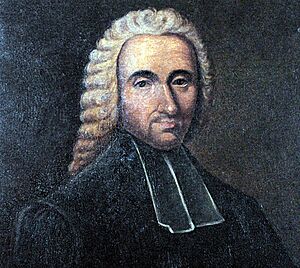Paul Rabaut facts for kids
Paul Rabaut (born January 29, 1718 – died September 25, 1794) was a French pastor. He led the Huguenot "Church of the Desert." This was a secret church for Protestants when their religion was forbidden. Many people saw him as the main leader of this hidden church. He was known for being a peacemaker and a smart person. Even though he was hunted, he lived in hiding for over 30 years.
Contents
Paul Rabaut's Life Story
Paul Rabaut was born in Bédarieux, France. His father was a cloth seller. In 1738, he became a preacher after a meeting of church leaders in Languedoc. In 1740, he went to Lausanne to finish his studies. He studied at a special school started by Antoine Court.
Leading the Secret Church
In 1741, Rabaut became the head of the church in Nîmes. By 1744, he was a vice-president at a big church meeting. From 1745 to 1752, Protestants faced harsh treatment. Rabaut had to hide during this time. In 1750, he even managed to talk to a military leader, the Marquis of Paulmy d'Argenson, while the marquis was changing horses.
For a while, the harsh treatment stopped. But it started again in 1753, and a reward was offered for Rabaut's capture. A French prince, Louis François de Bourbon, prince de Conti, showed interest in helping Protestants in 1755. Rabaut visited him that July. Between 1755 and 1760, times of harsh treatment and tolerance came and went.
Building the Protestant Church
By 1760, the hard work of Antoine Court and Paul Rabaut had paid off. French Protestantism was strong and well-organized. In 1762, during a time of more peace, Rabaut preached in two special places:
- One place was called the Hermitage. It was a large outdoor area near Nîmes. Thousands of people would gather there every Sunday. They sat on seats made of loose stones to listen to Rabaut.
- In summer, they moved to an old stone quarry called Lecque. This place was surrounded by huge rocks and had only two narrow paths to get in. It kept them safe from the sun and rain. Rabaut preached in this hidden cave for over 20 years. His words helped people keep their faith and hope alive.
Fighting for Freedom
Paul Rabaut, his son Jean-Paul Rabaut Saint-Etienne, and Court de Gébelin worked hard. They wanted the government to officially recognize Protestants. In 1775, when people were upset, a government minister named Turgot asked Rabaut to calm them down.
Rabaut kept working to improve the legal rights of Protestants. In 1785, the Marquis de la Fayette visited him. They planned for Rabaut's son, Rabaut Saint-Etienne, to go to Paris. He would speak for the Reformed Church there.
A New Era of Freedom
In November 1787, King Louis XVI signed a new law. This law allowed Protestants more freedom. It was officially recorded on January 29, 1788. Two years later, the National Assembly declared that everyone had freedom of belief. They also said that non-Catholics could hold any government job. Rabaut Saint-Etienne was even a vice-president of the National Assembly.
However, things changed when the Girondist political group lost power. Rabaut Saint-Etienne was involved with them. Paul Rabaut refused to stop being a pastor. So, he was arrested and taken to prison in Nîmes in 1794. He was held for seven weeks. Paul Rabaut died in Nîmes soon after he was released from prison.
See also
- Marie Durand
- Conventicles
 | Misty Copeland |
 | Raven Wilkinson |
 | Debra Austin |
 | Aesha Ash |


